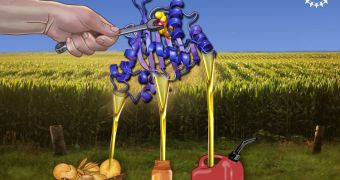A team of investigators in the United States has recently managed to discover the origins of a critically important class of proteins in plants. Their discovery could result in improved crop yields, increased food security, and advancements in biomedicine, nutrition and renewable biofuels.
The origin of the chalcone-isomerase protein family has been under research for many years, but thus far investigators have failed to discover anything of value. Now, a collaboration of experts at the Salk Institute for Biological Studies (SIBS) and the Iowa State University (ISU) have managed to solve the riddle.
SIBS scientist Joseph Noel and ISU expert Eve Wurtele, the leaders of the study, say that their teams were able to discover three new proteins, whose manipulations could result in a wide variety of improvements in numerous areas of chemistry and genetic manipulation.
Details of their study were published in the May 13 advance online issue of the top scientific journal Nature. Using the conclusions of this research, it may be possible to reduce some of the environmental pressure currently being applied to stressed ecosystems.
In addition, future works derived from this study could help address some of the world's most pressing issues, including the ever-growing demand for more food and fuel. Thanks to this research, scientists now have a better understanding of how chalcone-isomerase act.
Until recently, scientists only knew that the molecules played a role in the creation of flavonoids, a critically important class of plant compounds defend plants against excessive sunlight and pathogen infections.
In addition, flavonoids play a role in attracting pollinators and the physical development of plants. These molecules are one of the most active components in plant-rich diets that cancer patients use.
“This is a beautiful study demonstrating that chalcone-isomerase arose from another important class of proteins, which have no enzymatic activity but bind fatty acids. The findings may have important implications for agriculture and biofuel development,” says Greg Warr.
The expert holds an appointment as the acting deputy director of the US National Science Foundation (NSF) Division of Molecular and Cellular Biosciences. The DMCB funded the new investigation.
By manipulating the genes that encode for the three, newly found proteins, experts were able to obtain higher seed oil content. This improvement is very important for human nutrition, but also for the production of renewable biofuels, the team concludes.

 14 DAY TRIAL //
14 DAY TRIAL //